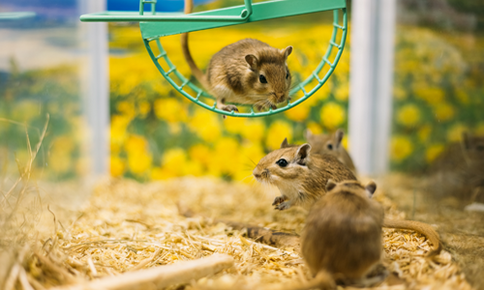
Gerbils are great little pets for pet owners who don't have room for a dog or cat. They're friendly and fun to watch, but they do take a moderate level of care and investment. If you're thinking of getting a gerbil, here's what you'll need to know to keep him happy and healthy, including giving him a mate.
Health
Your veterinary team will be happy to help guide you in the care and feeding of your pet gerbils, including making regular appointments for check-ups. As long as bedding is kept clean and diet is sufficient, gerbils are relatively easy to keep. Make sure you have at least two gerbils because they don't do well in isolation. You'll also need to make sure your gerbil habitat provides everything your pets need, including bedding and walls high enough to prevent them from jumping out.
Care
Caring for your gerbil requires a suitable habitat that allows your pets to dig and burrow as it comes naturally to them. In most instances, this includes enclosures such as a glass aquarium tank or gerbilarium. You'll want to add soft, cozy bedding such as organic peat, timothy hay, and shredded paper that they can dig into and use for nesting. Gerbils will chew on anything wood or plastic, so nesting boxes and food dishes should be made of clay or metal.
Feeding
Your veterinarian can help you devise a nutritional diet plan for gerbils. It should include vegetables such as cauliflower, broccoli, apples, and carrots, along with a commercial food formulated for gerbils. This will give your pet all the vitamins, minerals, and nutrients they need to stay healthy. You'll also need a watering bottle for small pets that can hang from the cage. Gerbils like to tunnel and bury, which is why a watering bowl inside the enclosure won't work.
Training
Gerbils are very smart and can be taught to come when called, beg for food, and navigate mazes. To train your gerbil, give him lots of love and cuddling, and reward him with treats such as raisins or pumpkin seeds for desired behavior.
